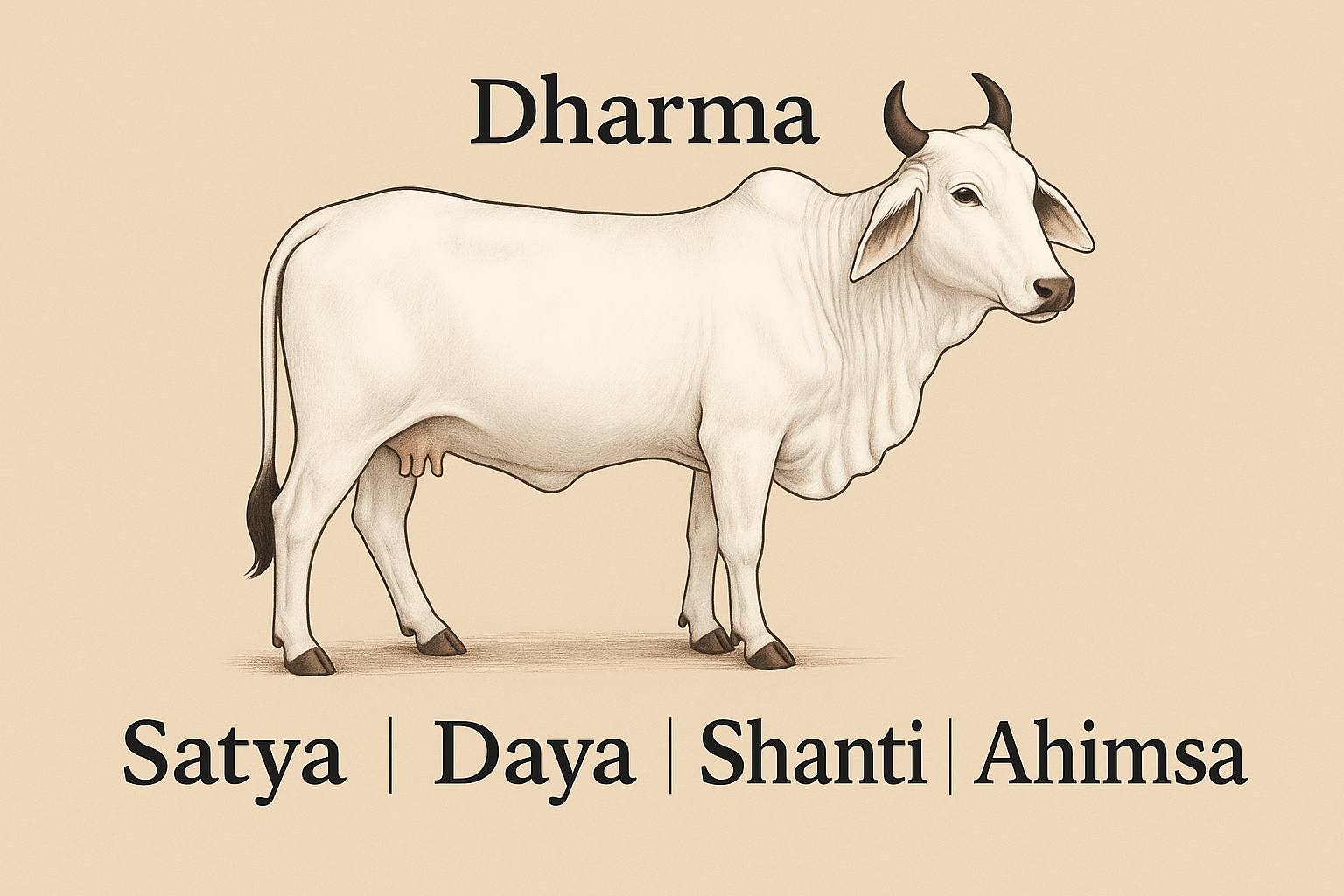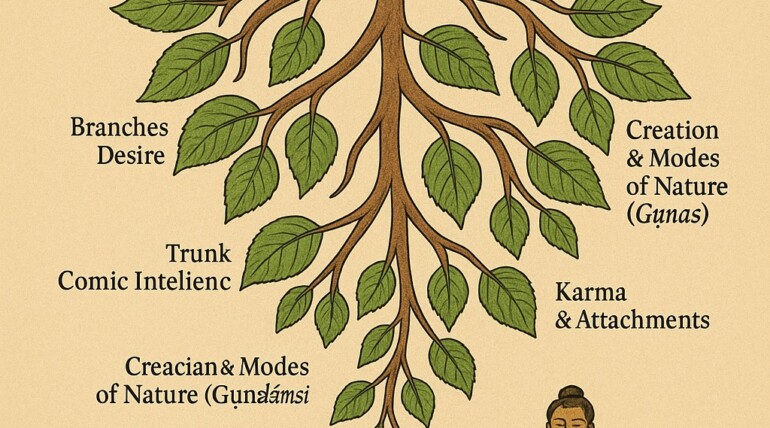What is Dharma?
Dharma is the very foundation of the universe. It protects and sustains existence just like a mighty bull (Vrishabha) standing on four strong legs.
- In Satya Yuga, Dharma stood firmly on all four legs.
- In Treta Yuga, it stood on three legs.
- In Dvapara Yuga, it managed to remain on just two legs.
- Now, in Kali Yuga, Dharma struggles to survive—standing precariously on just one leg.
These four legs of Dharma are:
- Satya (Truth)
- Daya (Kindness or Compassion)
- Shanti (Peace)
- Ahimsa (Nonviolence)
Sloka:
Satyam dayaa tathaa shanthirhimsaacheti keertitaah |
Dharmasya avayavaas tatha, chatvaarah poornatam gataah ||
I. Satya – Truth (12 Forms)
Amithyavachanam satyam sveekaara pratipaalanam|
Priyavakyam guroh sevaa drudham chaiva vratam kritam||
Aastikam sadhusangscha piturmaatuh priyamkarah|
Suchitvam dyividham chaiva hrirasamchaya eevacha||
Truth is not just about not lying; it is a multidimensional principle with twelve clear aspects:
- Amithyavachanam – Not speaking lies
- Sveekaara pratipaalanam – Being responsible and fulfilling one’s promises
- Priyavakyam – Speaking pleasantly and lovingly
- Guroh Sevaa – Serving one’s teacher with reverence
- Dridham chaiva vratam kritam – Observing vows with unwavering firmness
- Aastikyam – Having faith in God
- Sadhu sangah – Keeping the company of the virtuous
- Pitur Maatuh Priyamkarah – Pleasing one’s parents with good conduct
- Bahya Suchi – Outer cleanliness
- Antahkarana Shuddhi – Inner purity
- Hrih – Modesty or natural sense of shame in wrongdoing
- Asamchayah – Non-possessiveness or renunciation of greed
II. Daya – Kindness (6 Forms)
Paropakaro danam cha sarvadaa smitabhaashaNam|
ninayo nyunataabhavasveekarah samataa matih||
Compassion is the warm heart of Dharma. Its six expressions are:
- Paropakara – Helping others selflessly
- Daanam – Charity or giving
- Smitabhashanam – Speaking with a gentle, smiling voice
- Vinaya – Humility in conduct
- Nyoonata bhava sveekara – Seeing oneself as lower than others (absence of ego)
- Samataa Matih – Equanimity of mind, treating all equally
III. Shanti – Peace (30 Forms)
Anasooyaalpasansha indriyaaNam cha samyamah|
Asamgamoo maunamevam, deva pujavidhau matih||
Akutaschidbhayatvam cha, gaabheeryam sthirachittataa|
Arookshabhaavah sarvatra, nisspruhatvam drudhaa matih||
Vivarjanam vyakaaryaaNaam, samah poojaavamaanayooh|
Slaghaa paraguNee Sthaiyaam, brahama charyam dhritih kshamaa||
Atithyam cha japo homa, sthitardhasevaaryaseevanam|
Amatsaro bandhamokshajnanam sannasasabhavanaa||
sahishnutaa suduhkheeshu, akaarpaNyamamoorkhataa|
Shanti is the state of inner stillness and spiritual balance. It expresses itself through these thirty qualities:
- Anasuyata – Not finding faults in others
- Alpa Santosha – Being content with little
- Indriya Samyamah – Control over one’s senses
- Asangamo – Non-attachment
- Maunam – Silence, both external and internal
- Deva Pujavidhau Matih – Devotion to divine worship
- Akutaschid Bhayatvam – Fearlessness from everything
- Gabheeryam – Depth or gravity in character
- Sthira Chittataa – Steadiness of mind
- Aroosha Bhavah – Calmness, no violent tendencies
- Nisspruhatvam – Desirelessness
- Dridha Matih – Firmness in convictions
- Vivarjanam Vyakaaryaanaam – Avoidance of sinful acts
- Sama Pooja Avamaanayoh – Treating praise and insult alike
- Slagha Paraguni – Praising the good qualities of others
- Sthairyam – Stability
- Brahmacharyam – Celibacy
- Dhritih – Courage
- Kshamaa – Forgiveness
- Atithyam – Hospitality
- Japah – Reciting sacred mantras
- Homa – Offering oblations in fire rituals
- Sthita Artha Sevana – Serving spiritual wealth
- Arya Sevanam – Serving the noble and righteous
- Amatsarah – Absence of jealousy
- Bandha Moksha Jnanam – Knowledge of bondage and liberation
- Sannyasa Bhavana – Renunciation or dispassion
- Sahishnutaa – Enduring pain and hardships
- Suduhkheshu Akarpanyam – Not being miserly even during suffering
- Amomurkhataa – Absence of foolishness or ignorance
IV. Ahimsa – Nonviolence (7 Forms)
Ahimsa tyaasanajayah parapida vivarjanam|
Sraddhaa chaatidhya seevaacha, santirOpa pradarsanam||
Aatmiyataa cha sarvatra, aatma buddhih paramatmasu|
Ahimsa is not just physical nonviolence but also extends to thought and speech. Its seven aspects are:
- Ahimsa – Avoiding injury in thought, word, and deed
- Tyaaga – Renunciation of harmful acts
- Sanjaya – Victory over inner passions
- Para Peeda Vivarjanam – Abstaining from oppressing others
- Shraddha – Sincere spiritual faith
- Atithi Sevaa – Honoring guests and strangers
- Santi Roopa Pradarshanam – Embodying and expressing peace in all actions
- Aatmiyataa Sarvatra – Feeling closeness with all beings
- Aatma Buddhi Paramatmasu – Recognizing the divine Self in all beings
The Power of Even a Little Dharma
This is Dharma.
Following even a small part of it grants great protection.
Neglecting it—even slightly—can lead to terrible consequences.
Sloka from Brihad Dharma Purana (Purva Khanda 1.47):
Yathaa swalpam adharmam hi janayet tu mahabhayam |
Swalpam apyasya dharmasya traayate mahato bhayaat ||
Translation:
“Even a little unrighteousness (Adharma) can give rise to great danger.
But even the smallest practice of Dharma protects one from great calamities.”



